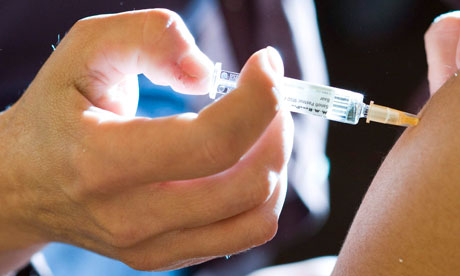
Every time I read a headline about the measles epidemic in Wales I flinch with shame. This is because I used to be one of those people who refused to have their child vaccinated – for anything. My daughter was born in a London hospital in September 2011, and every time the doctors, the health visitors and the nurses at the weighing clinic tried to give her the routine jabs, I put her back in her pram and wheeled her away.
The NHS schedule of inoculations felt so over the top, full of diseases I'd last heard mention of in gloomy Victorian novels. Injections at two, three, four, 12 and 13 months, for diphtheria, tetanus, tuberculosis, pertussis, polio – all these archaic names, not things that you actually think your child is going to catch. OK, so we lived in Hackney, with a diverse immigrant population, sometimes arriving from countries where those diseases are still active. In fact, our borough was one of the few places in Europe where tuberculosis was actually making a comeback. But not in my house – I mean, we had a washing machine and a fridge full of organic vegetables and surely, you know, only weak and sickly people could catch it?
I wasn't a completely barefoot do-gooding type by any stretch of the imagination, but I breastfed, and read a lot of alternative health forums online that left me convinced we had become too over-protective. It was good for children to catch diseases naturally and fight them off by themselves. My baby would build up a strong immune system all of her own, not have it interfered with by some paranoid government programme that seemed to involve pumping metals into her blood.
That was, until she caught pertussis – which turns out to mean whooping cough. Which turns out to mean months of pain. It is a highly contagious disease that comes in stages, but that horrible, hacking cough that kept her up all night went on for so many weeks that she was prescribed an inhaler. She was past her first birthday, so unlikely to die of it, like newborns can, but it's disgusting to watch your child needlessly suffer like that. My parents had to come to help us, and then we grownups all succumbed to the revolting condition too. Of course, having wanted to avoid filling her body with chemicals, I ended up giving her all the medicines I could find.
And yet I still wondered about that list of things that I would now, I suppose, have to surrender to and immunise my child against. Polio, for one – a couple of my parents' pensioner friends still carry the limp left by their childhood polio, but none of my friends do, because it isn't around any more. And diphtheria – what was that, even? I knew it had killed one of Queen Victoria's daughters, but that wasn't our reality.
The reason it wasn't our reality was, of course, due to a continuous programme of immunisation. Duh. Diphtheria is a disease that still kills one in five infants it meets, even if they get treatment, their necks swelling up until they can no longer breathe. I have now seen a picture of a child whose neck was ravaged by diphtheria, bloated like a foie gras goose about to burst. I wish I could unsee it.
Meningitis, though, I did know about. By the age of 17, I had lost two school friends to it – I went to their funerals. A third friend had survived. Those were three separate outbreaks in York in the 1980s and 1990s.
Writing this now, I can't even give a decent answer as to why I didn't at least get my daughter vaccinated against meningitis C (the B vaccine has not been licensed yet). To think that in my own lifetime – and I'm only in my mid-30s – diseases that used to kill my friends have been effectively suppressed. My daughter won't have to go to her friends' funerals like I did – as long as we keep giving them the jabs. And yet some of us are still coasting on herd immunity provided by other children, which is no longer enough, because of the growing number of people like me.
When it came to it, my mother still had to take my daughter for the injections, as I was too squeamish. The fact is, I still have a hunch that puts me off vaccinations, a hunch that I can't explain. I just feel funny about them. But I feel even funnier about the thought of mine or anyone else's kid dying of measles in this country in 2013, like Roald Dahl's daughter Olivia did in 1962. "Got to hospital," he wrote in his diary. "Walked in. Two doctors advanced on me from waiting room. How is she? I'm afraid it's too late."

